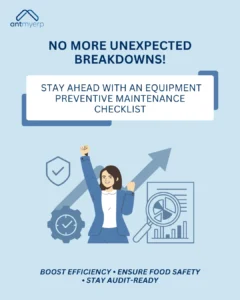Equipment Preventive Maintenance Checklist for the Food Industry
2025-11-14
The food and beverage industry is huge and needs machines to work smoothly and safely for on-going operations. This industry is worth about USD 5.3 trillion worldwide by 2027 as per Statista. In the food industry, every piece of equipment matters and in a commercial kitchen, there are a wide range of equipment, whether it be on a small scale of hand blenders or large-scale ovens or walk-in refrigerators. Most importantly, performing an equipment preventive maintenance checklist will ensure safe operation of equipment and to avoid any unexpected breakdown in the kitchen. It helps machines last longer and keeps food production running without trouble.
Understanding Preventive Maintenance in the Food Industry
Preventive maintenance in the food industry involves regularly scheduled inspections, cleaning, and servicing of equipment before a failure occurs.
According to an ABB survey, unplanned downtime can cost up to $30,000 per hour in major food plants.
Using AntMyERP’s CMMS (Computerized Maintenance Management System) for industrial preventive maintenance checklists helps:
- Automate equipment service schedules
- Track work orders and asset performance
- Prevent contamination and ensure compliance
- Extend machine lifespan and minimize downtime
Why Every Food Plant Needs an Equipment Preventive Maintenance Checklist
A structure equipment preventive maintenance schedule gives surety that all machines from mixers to conveyors are inspected, cleaned and calibrated on a routine basis.
This schedule is ideal for maintaining food safety and hygiene while ensuring compliance with FSSAI, FDA, and HACCP standards.
Complete Industrial Preventive Maintenance Checklist for Food Processing Equipment
Here is the detailed industrial preventive maintenance checklist for food processing plants to maintain performance and safety.
1. Blending and Mixing Equipment Maintenance Checklist
- Inspect all electrical and mechanical connections
- Check motors, bearings, and drive belts for wear
- Clean and sanitize detachable parts
- Calibrate mixing controls for consistent quality
2. Baking and Oven Equipment Preventive Maintenance
- Tighten loose hardware and electrical terminals
- Verify temperature settings and timers
- Check insulation and seals for heat loss
- Detect and repair gas or electrical leaks immediately
3. Refrigeration and Cooling Equipment Maintenance Checklist
- Inspect and calibrate temperature and humidity sensors
- Check refrigerant pressure and look for leaks
- Test alarms, cutoffs, and circuit safety
- Clean coils and fans for energy efficiency
4. Machine Preventive Maintenance Checklist for Food Processing
- Examine control panels and sensor calibrations
- Check motors, belts, and gear drives
- Inspect hydraulic and pneumatic systems for leaks
- Verify lubrication levels and cleanliness
5. Sanitation Equipment and Cleaning Tools Preventive Maintenance
- Clean and test filtration and pumping systems
- Inspect gaskets, seals, and hoses for damage
- Calibrate cleaning tools for precision
- Review and update sanitation SOPs regularly

Steps to Implement Preventive Maintenance in Food Processing Plants
A good maintenance plan is not only keeping food machines in working conditions or just about fixing faults when they appear. It requires everything from planning to teamwork, and regular check-ups.
- Create a Maintenance Schedule with CMMS
A maintenance schedule should include daily, weekly, and monthly tasks. Mixers, jars need daily cleaning every single day to stay hygienic, while sensors can be checked once a month for accuracy. Paying attention to small tasks on time keeps everything running smoothly.
- Assign Clear Maintenance Roles
Every member of the team must understand what maintenance assignment they have. Trained technicians should understand what is on each checklist and why it is important for safety purposes. It takes teamwork and coordination. When everyone understands their part, maintenance is accomplished more quickly and of a higher quality.
- Use AntMyERP CMMS for Easy Preventive Maintenance
AntMyERP’s Preventive Maintenance helps you plan and track everything in one place. It helps in setting reminders, records service history, and prepares reports that help you stay ready for audits to pass in HACCP or ISO 22000 standards.
- Keep Reviewing and Updating Your Maintenance Plan
A maintenance plan involves setting it and keeping reviewing it. Teams are supposed to review reports, monitor what is being effective, and then make small adjustments to improve on the preventive maintenance plan. Regular reviews contribute to maintaining health, safety, and productivity of the food plant.
Top Benefits of an Industrial Preventive Maintenance Checklist
According to Food Engineering Magazine, manufacturers using digital CMMS tools experience a 20–25% drop in downtime and up to 15% efficiency gains.
Using a structured machine preventive maintenance checklist provides measurable benefits:
- Reduces Downtime: Detect faults early and fix before failure
- Improves Food Safety: Ensures hygienic equipment operations
- Extends Equipment Lifespan: Regular lubrication and calibration
- Ensures Compliance: Meets FDA, FSSAI, and HACCP standards
- Optimizes ROI: Minimizes costly repairs and replacements
Conclusion: Preventive Maintenance in the Food Industry Drives Quality and Compliance
Preventive maintenance within the food industry is not just maintaining conditions and maintaining machine performance, it is all about securing the integrity of the product and your brand reputation.
When you follow a solid routine with AntMyERP’s CMMS equipment preventive maintenance checklist, you will benefit from smooth operations, more uptime, and being more compliant.
AntMyERP also offers integrated solutions for AMC Management, Warranty Tracking, After-Sales Service, and RMA Management empowering manufacturers to achieve complete operational control.
For restaurant and kitchen businesses, explore how kitchen equipment Service Software can simplify your preventive and field service maintenance tasks.

